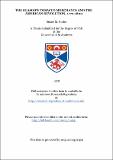Files in this item
The Glasgow tobacco merchants and the American Revolution, 1770-1800
Item metadata
| dc.contributor.author | Butler, Stuart M. | |
| dc.coverage.spatial | 335 p. | en_US |
| dc.date.accessioned | 2018-06-26T15:13:46Z | |
| dc.date.available | 2018-06-26T15:13:46Z | |
| dc.date.issued | 1978-03 | |
| dc.identifier.uri | https://hdl.handle.net/10023/14631 | |
| dc.description.abstract | The tobacco trade formed the basis of the Chesapeake economy during the Eighteenth Century. Tobacco was shipped to Britain during the -colonial period, in accordance with the Navigation Acts, and then sold in European markets. The French market increased rapidly during the first half of the century, and the Glasgow tobacco companies took the lead in supplying the French monopoly administered by the Farmers General. The Scots gained the advantage over other British merchants by setting up networks of stores to facilitate the collection of tobacco and the sale of goods, and by devising an extensive credit system to cater for the needs of the smaller planters in the Piedmont. The Scottish merchants were in fierce competition with each other, and with English merchants. This competition ensured that the planters were not, to any significant degree, exploited by the merchants. In many cases, the planters were able to combine in order to extract very favourable prices and credit facilities. The Scots were a closely-knit community, and although many left the Glasgow companies to become independent traders they were seen as outsiders. Radical propagandists encouraged this feeling in order to arouse anti-British sentiment. The allegations levelled against the Scots, however, were largely groundless. When war broke out a large proportion of the Scots left the Chesapeake, and the assets of the Glasgow companies were seized. Nevertheless, the Scots set up a system of agents in New York and the West Indies, both to supply the rebelling colonies with goods in exchange for tobacco wherever this was practicable, and to have channels available for a speedy return to the Chesapeake whenever peace was declared. After the war significant numbers of Scots returned to the Chesapeake, in order to collect debts and to trade in goods and tobacco. Many planters returned to their pre-war Scots companies, and trade once again fell into the colonial pattern. Britain dominated the carrying trade, the only major difference being that it was now not necessary to call at a British port before proceeding to Europe, other than to collect orders. The readiness of planters to return to the old pattern of trade suggests that it was advantageous to the Americans, and not a mere product of the Navigation Acts. The Scots were not successful in using trade after the war as a means of recovering debt; and with the outbreak of war in Europe, most companies closed their stores and relied on the assistance of the British government to recovery debts. Yet many of the Scots factors remained in the Chesapeake, and continued to trade and benefit the area. | en_US |
| dc.language.iso | en | en_US |
| dc.publisher | University of St Andrews | |
| dc.subject.lcc | HD9141.8G6B8 | en |
| dc.subject.lcsh | Tobacco industry--Scotland--Glasgow--History | en |
| dc.title | The Glasgow tobacco merchants and the American Revolution, 1770-1800 | en_US |
| dc.type | Thesis | en_US |
| dc.type.qualificationlevel | Doctoral | en_US |
| dc.type.qualificationname | PhD Doctor of Philosophy | en_US |
| dc.publisher.institution | The University of St Andrews | en_US |
This item appears in the following Collection(s)
Items in the St Andrews Research Repository are protected by copyright, with all rights reserved, unless otherwise indicated.

